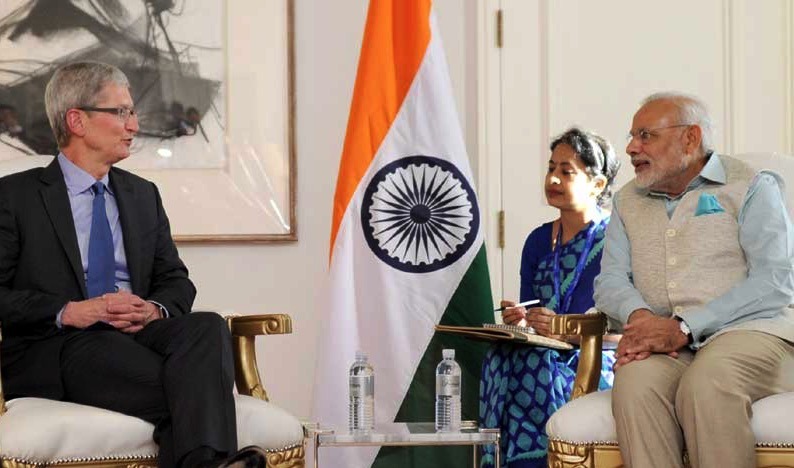Apple continues to work with the Indian government to penetrate the growing mobile market, and is seeking relaxed product labelling laws, as well as tax benefits to start manufacturing the iPhone inside the country, which is now the second largest smartphone market in the world.
According to a report from the Economic Times, Apple in November requested that the country waive the requirement to print the product's information, including specifications and a bill of materials, directly on the phone so the minimalist design of the device isn't compromised.
As part of the negotiations, India's Department of Industrial Policy and Promotion (DIPP) sent Apple's waiver request to the Department of Revenue and Department of Electronics and Information Technology for debate and assessment.
Additionally, Apple is still dealing with the finance ministry to secure subsidies or tax benefits for building a plant inside India. Apple and its manufacturing partner(s) could receive help under the Modified Special Incentive Package Scheme, which among other things can provide subsidies if a company sets up shop in one of India's "Special Economic Zones" — areas with lowered government regulations designed to lure foreign firms.
Currently, China is the leading market for smartphones, and about 70 percent of the value from the market is returned to the domestic economy. India unseat the U.S. for second place in 2016, and returns only about 5 percent.
Even without Apple manufacturing plants in the country, or corporate-owned Apple retail stores, the company seized 66% of India's premium phone sales in October.
Three-year timer
India's government recently allowed businesses a three-year grace period before they have to comply with sourcing laws. After the three-year period, single-brand companies must source at least 30 percent of sold goods in India.
If a company can prove that it sells state-of-the-art equipment, the waiver is extended to five years. However, Apple failed to hurdle that bar when initially dealing with the sourcing rule.
Foxconn is on the ground
Foxconn was reportedly close to signing a deal to purchase a roughly 1,200-acre plot of land in Maharashtra in May, on which will be built a $10 billion manufacturing plant serving Apple's needs. Sources estimate that it would take about 18 months before the facility is operational from the start of construction, but it is not clear where the construction stands.
"Since last year, we have restarted operations and right now we're in finalizing 2017 plan, there will be more expansion," said India Foxconn head Josh Foulger in the end of October. "Companies like Apple will have to take a diligent view on the market in India."
... and Apple is too
Apple CEO Tim Cook and entourage toured India in May. During his limited time in the country, Cook said he learned a great deal about India's business and culture, two key elements Apple must understand if it hopes to gain a foothold in the region.
Cook detailed Apple's multi-pronged approach in an interview, and to the country's prime minister, discussing comprehensive evaluations of government operations, consumer culture, media, services, and technical talent. This includes investments like a recently announced iOS design and development center in Bengaluru and a Maps development facility in operation in Hyderabad.
Apple is also said to have tapped European logistics firm and global operating partner DB Schenker to build and manage a distribution facility in Bhiwandi.
 Mike Wuerthele
Mike Wuerthele







-m.jpg)






 Malcolm Owen
Malcolm Owen
 William Gallagher
William Gallagher
 Charles Martin
Charles Martin
 Christine McKee
Christine McKee
 Wesley Hilliard
Wesley Hilliard

 Andrew Orr
Andrew Orr







4 Comments
Article never explains what the contention is with label laws!
From the article, second paragraph. "According to a report from the Economic Times, Apple in November requested that the country waive the requirement to print the product's information, including specifications and a bill of materials, directly on the phone so the minimalist design of the device isn't compromised."
Maybe it is because the whole idea of printing such information directly on an aspirational consumer product like an iPhone is considered a non starter by both consumers, competing phone manufacturers and the very government that initially considered such an ill advised regulation or standard.